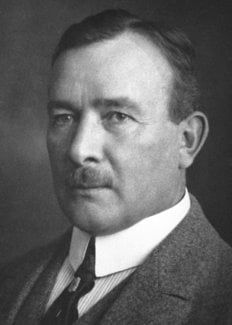Erik Axel Karlfeldt
Biographical

Erik Axel Karlfeldt (1864-1931) was born in Karlbo in the province of Dalekarlia. The name Karlfeldt, which he assumed in 1889, was derived from the name of his father’s farm; his parents were Erik Janson and Anna Stina Jansdotter, both of whom came from old mining families. Karlfeldt attended schools at his birthplace and at Västerås, where he graduated in 1885. He studied at the University of Uppsala and received his degree in 1898. Between 1893 and 1896, he taught at the private grammar school at Djursholm and at the school for adult education at Molkom. For a short time he worked for a Stockholm paper.
After completing his studies, he held a position at the Royal Library in Stockholm for five years. In 1903 he was appointed librarian of the Agricultural Academy. Meanwhile he had found recognition as a poet, and in 1904 was elected to the Swedish Academy. In 1905 he became a member of the Nobel Institute of the Academy and in 1907 of the Nobel Committee. In 1912 he was appointed permanent secretary of the Academy and henceforth devoted all his time to this position (although he did remain a member of the Nobel Committee) and to his poetry. In 1917 he received an honorary doctorate from the University of Uppsala
Individual poems of his had appeared even during his school days; his first collection Vildmarks-och kärleksvisor [Songs of the Wilderness and of Love] was printed in the autumn of 1895. It was followed by Fridolins visor (1898) [Fridolin’s Song], Fridolins lustgård (1901)[Fridolin’s Pleasure Garden], Flora och Pomona (1906) [Flora and Pomona], Flora och Bellona (1918) [Flora and Bellona], and Hösthorn (1927) [The Horn of Autumn]. Selections of his poetry, translated into English by Charles Wharton Stork under the title Arcadia Borealis, were published in 1938.
Karlfeldt wrote a short life of the Swedish poet Lucidor (1909) and a necrologue for Carl Fredrik Dahlgren in the proceedings of the Swedish Academy. A collection of his speeches appeared in print shortly after his death in 1931.
This autobiography/biography was written at the time of the award and first published in the book series Les Prix Nobel. It was later edited and republished in Nobel Lectures. To cite this document, always state the source as shown above.
Erik Axel Karlfeldt died on April 8, 1931.
The Nobel Foundation's copyright has expired.Nobel Prizes and laureates
Six prizes were awarded for achievements that have conferred the greatest benefit to humankind. The 12 laureates' work and discoveries range from proteins' structures and machine learning to fighting for a world free of nuclear weapons.
See them all presented here.
